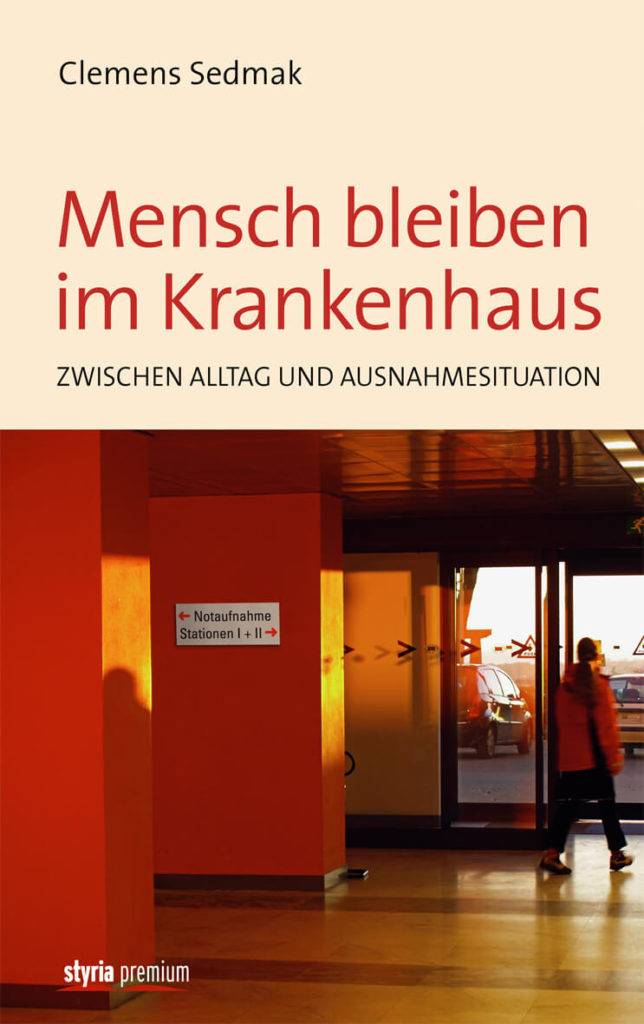Ethics in the Daily Routine of Hospitals
How do doctors, nurses, patients and relatives cope with everyday life in a hospital?
Ethics in the Daily Routine of Hospitals
ABOUT THE RESEARCH:
Clemens Sedmak’s book Mensch bleiben im Krankenhaus – zwischen Alltag und Ausnahmesituation (Staying Human in Hospitals – Caught Between the Daily Grind and Exceptional Circumstances; Styria Verlag) was published in 2013. In this publication, Sedmak develops ethical guidelines for hospitals. Now, in a second stage of the project, our researchers aim to apply these guidelines to a practical setting.
In cooperation with the Salzburger Landeskliniken (Salzburg State hospitals), the researchers involved in the project focus on the particular challenges faced by employees and patients at the university clinic for mouth and maxillofacial surgery in Salzburg. The project’s running time is 18 months, its implementation is conducted by Stephanie Höss, Gunter Graf and Elisabeth Buchner.
In hospitals, people achieve extraordinary things. Patients are cured or are at least relieved from their sufferings. The progress of modern medicine continuously increases the range of possibilities available to doctors. Without doubt, this is a very positive development. Hospitals are, however, special places; and the work that is done there unavoidably results in ethical challenges and imperatives for nurses and doctors.
This project aims to closely examine the daily routine at the clinic for mouth and maxillofacial surgery. In cooperation with the hospital’s employees and patients, ethically relevant issues will be made explicit. In a second step, and again in close cooperation with the hospital’s employees, our researchers will present suggestions that allow for ethical improvements and assist in their implementation.
Staying Human in Hospitals
A book project
ABOUT THE RESEARCH
The project “Ethics in the Daily Routine of Hospitals” analysed three major subject areas concerned with the daily routine of doctors, nurses, patients and people they are affiliated with. The first subject area focused on all the fundamental actions that are an inherent part of being a human being. This includes, for instance, eating, sleeping, excretion, physical activities and communication. Many patients find themselves in a vulnerable position and rely upon support, even in the performance of private and intimate actions. In practice, this often results in a violation of the private sphere and is perceived as humiliating and degrading.
The second topical focus centred on the matters of space and time in hospitals. Many workflows are shaped by rules and standardisations. The patient’s scope of action is confined and their abilities to co-determine their fate are limited. The people working at the hospital perceive time as a scarce resource. They usually experience an enormous pressure to perform, places of retreat are rare and, accordingly, the general conditions do not support ethical actions the workers have reflected upon.
The third subject area regarded the relations that occur in the setting of a hospital. It revealed the weak position of patients, when compared to the hospital’s employees. Fears and insecurities, pain and suffering, as well as differences in knowledge, abilities and powers result in asymmetrical relations.
The study is based on a comprehensive analysis of the reference literature as well as interviews with experts and hospital employees from Salzburg.
Clemens Sedmak has used the gained insights for his book “Mensch sein im Krankenhaus: Zwischen Alltag und Ausnahmesituation” (Staying Human in Hospital: Caught Between the Daily Grind and Exceptional Circumstances). In the book, Sedmak develops basic features of an ethical approach to the daily routine of hospitals. The book was published in 2013 by Styria Verlag.
